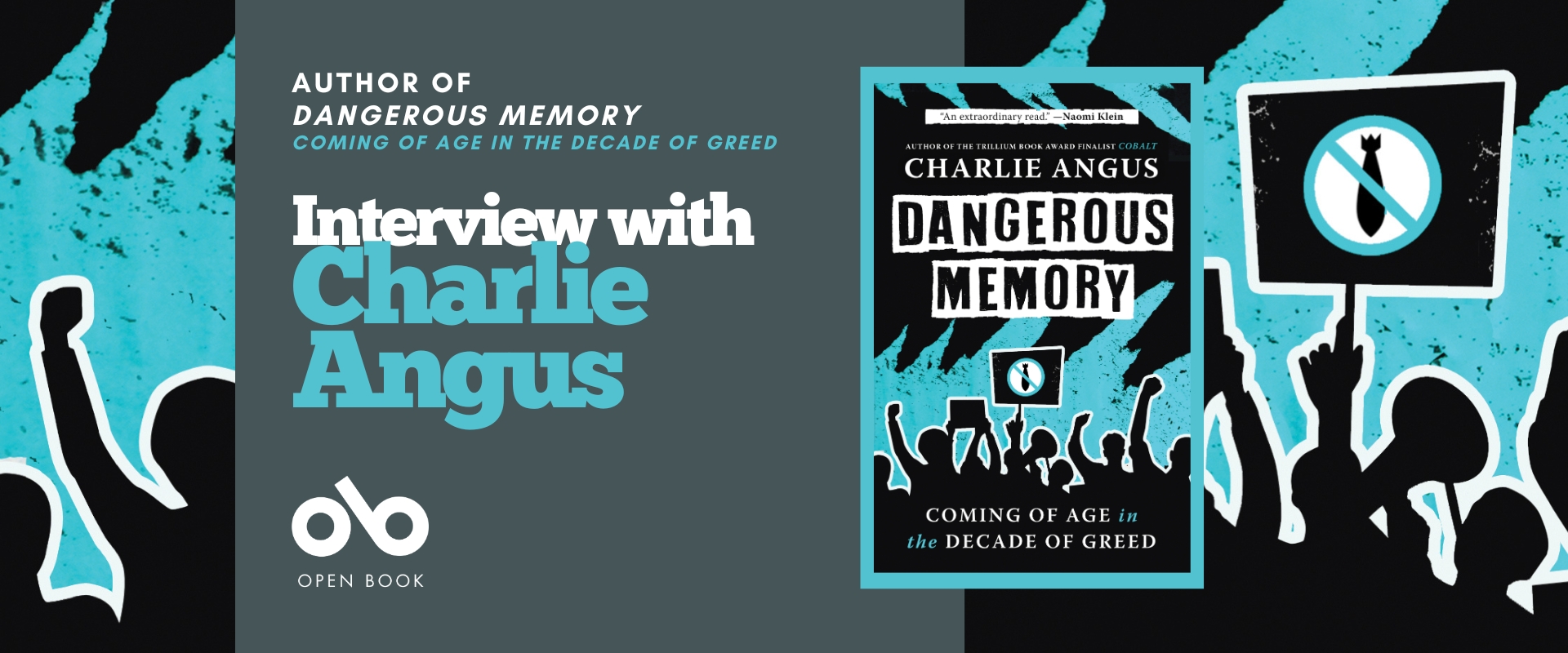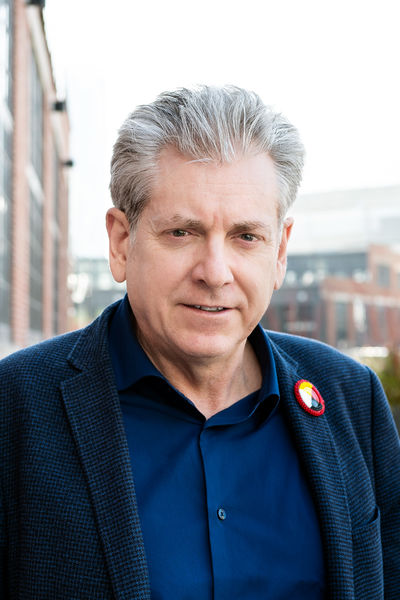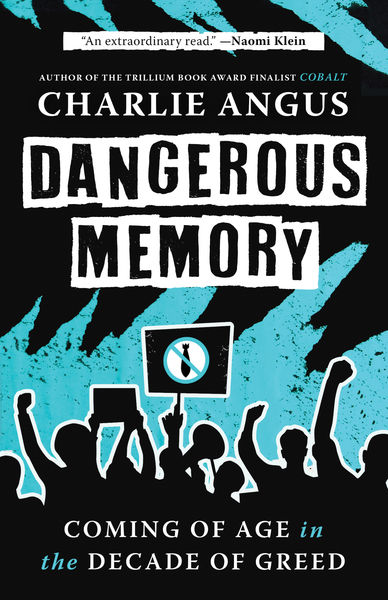In Dangerous Memory, Charlie Angus Unpacks the 1980s and the Many Ways that the Decade Still Haunts Us
Coming of age in the 1980s is something that if often seen romanticized or parodied in popular culture, with some of the more ridiculous and lively touchstones of the era featured in film, literature, and other accounts of that distinct period. But, for those who actually experienced the societal and political turmoil underneath it all, this decade holds a very different meaning.
Long-serving Member of Parliament, Charlie Angus, has his own memories and observations about the 80s, and the lasting legacy of economic, environmental, and social effects that we're still reeling from today. Angus has already built a reputation as a savvy author, who experiences the impact of this kind of fallout in his home region in Northern Ontario, and beyond. Never reluctant to unpack the good and ill contained in a pivotal era in a nation's history, he has written the new nonfiction work, Dangerous Memory (House of Anansi Press), which looks squarely at the 1980s and what the decade truly was.
Threats of nuclear war, The Chernobyl disaster, the Digital Revolution, the AIDS epidemic, the fight against South African apartheid, the rise of neoliberalism, and the fall of the Berlin Wall. All of these events define the 80s, but it was also a time of resistance, creativity, and hope. And, as Angus discovered in his own life, the 80s also showed young people pathways forward and ways to plant seeds of change that would confront systemic injustice and lead to a better world.
Read more about this riveting exploration of the 1980s, and all of its trappings, right here in this True Story Nonfiction Interview with the author!
Open Book:
Tell us about your new book and how it came to be. What made you passionate about the subject matter you're exploring?
Charlie Angus:
The idea for this book was always there – although in nothing like the form it became. In my early twenties I began keeping a diary of my time in a political punk band and the “crisis” I had that made me feel I needed to do something more. At 25, my wife and I opened our home to people coming out of prison, refugees, young runaways. We had no money or expertise. My diary documented the people we lived with and the situations we found ourselves in. Needless to say, I grew up very quickly.
For the longest time, the diary sat in a banker’s box in a back bedroom. I always assumed that one day I would reopen that diary and begin putting those memories into a manuscript. However, when I finally returned to it, I realized I had no interest in revisiting my conflicted feelings as an idealistic youth. I also recognized that the stories were of people in very vulnerable and stressful situations. I didn’t want to write some kind of “tell all” book about my time on the streets.
What interested me about the diary were the clues it contained in casual references to a world that was dramatically transforming around me. This was the real story. I began to rethink the project as a partial memoir that was less focused less on me and more on the huge shifts that were occurring in the 1980s. I used the diary as a platform to build a larger social and political history.
And as I researched I began to see how a young generation are living the direct impacts of the political, social and economic struggles of the 80s. And thus, the project took another transformation by becoming a call to arms for people today.
Your CanLit News
Subscribe to Open Book’s newsletter to get local book events, literary content, writing tips, and more in your inbox
OB:
Is there a question that is central to your book? And if so, is it the same question you were thinking about when you started writing or did it change during the writing process?
CA:
The central question of Dangerous Memory is the responsibility of the individual to try and respond to much larger historical forces. This is a question that has been with me my whole life. Chalk it up to growing up in the 1980s, a time of intense political activism. In the book I look at how young generation stood up to the threat of nuclear annihilation and systemic injustices. People came together and literally saved the world without a shot being fired.
And yet, the 1980s also unleashed the political forces that have caused massive economic, social, and climate precarity. A young generation is living with the impacts of what went down on my watch. Could I have done more? Can I do more now? This book is a history but also a challenge to try and reshape a world that is increasingly frightening and dystopic.
OB:
What was your research process like for this book? Did you encounter anything unexpected while you were researching?
CA:
For any book project that I undertake I read as widely as I could and drew on many seemingly disparate sources. I love diving down rabbit holes in search of strands that can be woven into a larger narrative. Since I didn’t know how broad this history of the decade was going to be I dove into all manner of histories – from Canada’s punk rock origins to the Cold War, to the rise of gentrification. I did a deep dive into the phenomenon of postal shootings (going postal) in the mid 1980s and saw how it could tell the story of the traumatic impacts of the Reagan counter-revolution on the American working class.
In this research I uncovered many threads that surprised, shocked, and often gave me hope. I tell the story of how a pop song, a made for TV movie and four young mothers from Wales literally saved the planet from destruction. I was also deeply moved to learn about a showdown at a dismal industrial parts plant in Oshawa in 1980 that became a watershed moment in Canadian resistance to economic shock doctrine. These are stories of resistance that deserve to be remembered.
OB:
Do you remember the first moment you began to consider writing this book? Was there an inciting incident that kicked off the process for you?
CA:
I was talking with some young Gen Z activists and I could hear the anger in their voice as they spoke of their grief of a future that will be denied to them because of the looming climate catastrophe. It brought me back to being 18 and my own dread of the looming nuclear nightmare. I wanted to let these young people know that they weren’t alone. I felt the need to dig deeper to understand how the mass movements that ended the Cold War and brought down Berlin Wall came about. Could lessons from those struggles help in the struggles today?
OB:
Did you write this book in the order it appears for readers? If not, how did it come together during the writing process?
CA:
The book has undergone multiple rewrites. A huge issue was pacing. For the longest time I was stumped by the question of how to integrate the personal stories within the broader historic discourse. There was also a question of how to tell a linear history of the changes within the decade while trying pull on the threads of issues that impact us today. I didn’t want to write a nostalgia piece. I wanted a book that that means something today. I relied on a number of trusted eyes to give me their thoughts. I was also pleased to be able to work so closely with House of Anansi on the red pencil rewrites to create a coherent story.
OB:
What defines a great work of nonfiction, in your opinion? Tell us about one or two books you consider to be truly great books.
CA:
I read an enormous amount of non-fiction One of the greatest I have read in recent years is John Vaillant’s Fire Weather. I was also blown away by Naomi Klein’s Doppleganger. Both books present the world we see and know but give us language to express what we have been struggling to articulate.
OB:
What are you working on now?
CA:
I am in the early stages of research on the 1930s. Like my other projects, I try to tell a broader history from a vantage point of a very specific locale. In this case I want to examine the depression through the dramatic social struggles that took place in the gold mining towns of Northern Ontario in that period. This is, in some ways, a follow-up to my book Cobalt: Cradle of the Demon Metals. I have always felt there is a much wilder, darker and more troubling history of these multi-cultural outposts.
______________________________________________
Charlie Angus is a nationally recognized politician, author, and musician. He has published nine books and is the recipient of numerous writing awards, including the Trillium Book Award finalist Cobalt: Cradle of the Demon Metals, Birth of a Mining Superpower. Angus has served in the Canadian Parliament for twenty years. He has earned a national reputation as a fierce fighter for social justice and Indigenous rights. Angus was the founding member of Toronto punk band L’etranger. He is the leader of the roots band Grievous Angels; their ninth album is Last Call for Cinderella. Angus lives in Cobalt, Ontario, with his wife, author Brit Griffin. They have three daughters.





